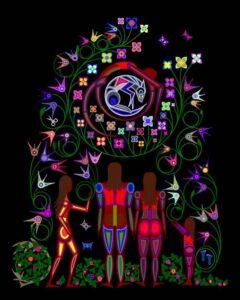It was a detailed response to the 94 calls to action issued two years earlier by the Truth and Reconciliation Commission of Canada (TRC). The U of T report presented its own set of 34 calls to action mirroring those of the TRC. They addressed the university’s approach to Indigenous spaces, faculty, staff, students, curriculum and research, as well as the role of institutional leaders in driving change.
The Wecheehetowin committee advised that the university examine current funding sources to determine how they could be better deployed to support Indigenous students. It also called for “a targeted fundraising initiative to build support for both scholarships and needs-based bursaries for Indigenous students in undergraduate, graduate and professional programs.”

The Wecheehetowin report cover featured committee member Lisa Boivin’s painting The Transition of Little Wolf. In her artist’s statement, she writes that “painting the history of colonialism encourages healing for Indigenous and non-Indigenous peoples.”
The report’s recommendations highlighted the need for additional funding while bringing attention to the support for Indigenous students already being provided by philanthropic donors.
The U of T Endowment funds several such scholarships, including:
- The Ontario Library Association (OLA) Indigenous Student Scholarship, established in 1987 with support from the Ontario government. It honours the 40-year public library career of Grace Buller, who worked to meet the needs of equity-deserving groups across the provincial library system, with a particular focus on services for Indigenous communities. The scholarship is based on academic merit and is open to Faculty of Information students who self-identify as Indigenous.
- The Edward and Dorothy Dawson Award for Indigenous Students, which supports young scholars in financial need, especially those enrolled in science-related studies. It was funded by a bequest from Edward Dawson a U of T- educated geophysicist whose many research trips to the Canadian Arctic enabled him to build lasting relationships in remote Inuit communities.
- The Bennett Scholars program, which supports undergraduate students in financial need, giving particular consideration to candidates with Indigenous backgrounds and those who are the first in their families to attend university. The award honours the legacy of Avie Bennett, a real estate developer, philanthropist and U of T alumnus whose long-time support for the university has been sustained by additional generous gifts from the Bennett Family Foundation.
The impact of the university’s steadfast and growing support for Indigenous students comes to life through the stories of four recent recipients:
Jasmine Dorothy Wemigwans
OLA and Dawson awards
Currently in her first year of the Library Sciences, Master of Information program, Jasmine has a strong interest in Indigenous cultural preservation and the decolonization of library spaces. “I hope to be a positive inspiration and kind influence in the library and information sector,” she says, “bringing Indigeneity to the space in creative and inviting ways. Receiving this support encourages me to feel confident in myself as a young Indigenous woman and to keep striving for my dreams. I am determined to succeed!”

Grace David
Dawson award
An Honours BSc student pursuing a double major in physiology and global health, Grace has also received the Fletcher-Clark Scholarship in Science and Economics for Black and Indigenous Students, funded by donors Ed and Fran Clark (see page 28). “I would love to make healthcare more accessible to communities that have often been underprivileged and underfunded,” Grace says. “This financial support has allowed me to focus on my studies, which is extremely important for maintaining a competitive academic record as I consider going to medical school and becoming a doctor.”
Andrew Wiebe
OLA award
A member of Métis Nation Saskatchewan who identifies as Indigi-Queer, Andrew received the OLA award in 2020–2021 while completing his master’s degree in Information Systems and Design & Archives and Records Management, as well as an MA in Medieval Studies. Now pursuing a PhD in the Faculty of Information, his research focuses on systematically building Indigenous and Queer stories into institutions’ archival practice. “Too often, community work and social issues are side projects within larger systems,” Andrew says. “The generous support I’ve received has provided opportunities to include Indigenous issues within the larger umbrella of social issues in information.”
Cameo Sheila Wemigwans
Dawson and Bennett Scholar awards
In her final year of the Honours BSc program, Cameo is pursuing a double major in biochemistry and molecular genetics. She hopes to work in healthcare and contribute to research on how the health system can better support Indigenous people and other under-served populations. “As a student from a low-income background, I’ve faced financial burden throughout my education,” Cameo says. “With this award, I’ll be able to go on to nursing school and become a registered nurse. I’d like to help create a welcoming and culturally safe healthcare environment in Indigenous communities across Canada.”
Scholarships, bursaries and other forms of financial assistance to students account for the largest share of the total paid out annually from the University of Toronto’s Endowment funds. For the U of T fiscal year ending April 30, 2024, about $1.56 billion – representing 43% of the university’s total $3.62 billion in endowments* – was directed to student support.
* The “Endowment portfolio” managed by UTAM – also called the Long-Term Capital Appreciation Pool – comprises the university’s endowment funds plus other investment assets. As of April 30, 2024, U of T’s fiscal year-end, the total value of the Endowment portfolio was $4.4 billion, including $3.6 billion of endowment funds plus $0.8 billion of other long-term assets. (At UTAM’s year-end – December 31, 2024 – the Endowment portfolio was valued at $4.9 billion.)